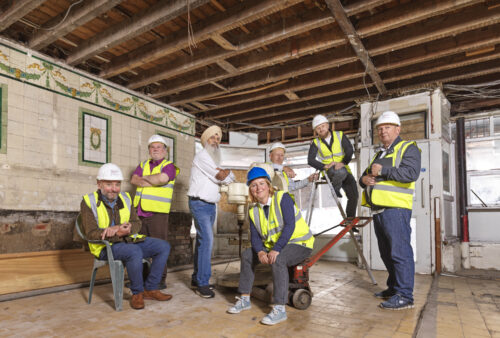Value of Heritage-led Regeneration for England’s High Streets Revealed by AMION Evaluation

Historic England has today (Monday 17th March 2025) published AMION’s independent evaluation of the High Streets Heritage Action Zone. Developed in response to the changing use of high streets, Historic England’s innovative, heritage-led, solution demonstrates how the loosening of the grip of retail on the high street can be an opportunity to reimagine them as vibrant centres of their community.
Led by Historic England, in partnership with Arts Council England and the National Lottery Heritage Fund, the programme ran from 2020-24 and unlocked the potential of 67 historic high streets across England.
Recognising cultural heritage as a catalyst for regeneration, the programme was designed around three core objectives:
- to support sustainable economic and cultural growth on and around high streets;
- to change perceptions of heritage and high streets; and
- to restore and enhance local historic character.
The High Streets Heritage Action Zone programme transformed high streets into vibrant community spaces by creating new partnerships, empowering communities, and celebrating local culture through heritage.
AMION’s innovative evaluation tests new ways to measure the benefits of heritage-led regeneration and assesses long-term value.
The evaluation shows that investing in historic places stimulates growth by creating jobs and attracting investment, as well as generating a renewed a sense of local pride. The programme has helped to reimagine high streets as cherished community spaces, attractive to both local people and visitors.
Evaluation Results
The programme had three key strands of delivery:
- Capital Works: The programme repaired 723 historic buildings, restored 462 shopfronts, and brought many vacant buildings back into use.
- Cultural Programming: Hosted 1,695 public events, 592 school activities, and 336 artworks and installations, drawing new visitors and strengthening local identity.
- Community Engagement: Delivered 634 construction training sessions, 160 volunteer training sessions, and 42,503 volunteer hours dedicated to making their high streets more attractive places to visit.
The programme was delivered during a time of uncertainty, from the Covid-19 pandemic to geopolitical instability and economic pressures. Rising costs, supply chain disruptions, and evolving net-zero targets added to the complexity as the programme had to adapt to these challenges. Attracting private sector investment was particularly challenging in these circumstances.
Responding to these challenges, the programme’s impact was significant:
- Economic Growth: Created over 700 jobs worth over £34m per year, delivered £1.34 return per £1 invested, as well as other non monetisable benefits for communities and the cultural sector, and leveraged £140 million in additional investment.
- Urban Transformations: 43,564 square metres of commercial space and 224 homes were brought back into use or created, and 119,442 square metres of public realm was improved.
- The benefits from the programme are valued at over £245 million.
Historic England will use the lessons from the High Streets Heritage Action Zone programme to shape place-based heritage investments, ensuring that heritage continues to be an effective driver of economic, social, and cultural renewal.
The programme’s approach has brought regeneration to where it’s needed most, proving that heritage is not just about the past – it’s a powerful catalyst for future growth.
Duncan Wilson, Chief Executive of Historic England said: “The evidence is clear: the High Streets Heritage Action Zone programme demonstrates that heritage-led regeneration can create impactful and sustainable change in a way that improves people’s lives. The evaluation highlights a new approach to ensuring our high streets can adapt and grow to support our local communities. By sharing this report we hope others can benefit from the lessons we have learned over the past four years, working across 67 high streets, so that future high streets can also be strengthened, creating economic growth and becoming much valued places for communities to use and enjoy for years to come.”
Read the evaluation report here: https://historicengland.org.uk/advice/heritage-action-zones/regenerating-historic-high-streets/evaluation-report/